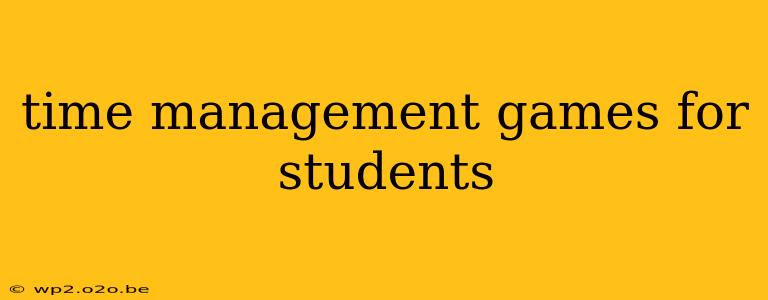Are you a student juggling classes, extracurriculars, a social life, and maybe even a part-time job? Feeling overwhelmed and struggling to stay on top of everything? You're not alone! Many students find themselves battling procrastination and poor time management. Luckily, there's a fun and effective way to improve: time management games! These engaging games can transform the often-dreaded task of time management into an enjoyable learning experience. This post explores the benefits of these games and highlights some top picks for students of all ages and academic levels.
Why Time Management Games Work
Traditional lectures or study guides on time management can sometimes feel dry and ineffective. Time management games offer a unique approach:
- Interactive Learning: Games make learning active and engaging, making it easier to grasp key concepts. Instead of passively reading about prioritizing tasks, you actively practice these skills within the game's context.
- Gamified Rewards: The reward system inherent in games motivates players to improve their time management skills. Unlocking achievements, earning points, and progressing through levels provide positive reinforcement, encouraging consistent effort.
- Safe Space for Mistakes: Games provide a risk-free environment to experiment with different time management strategies. Making mistakes in a game has far less consequence than missing a deadline in real life, allowing for valuable learning from errors.
- Practical Application: The skills learned in these games directly translate to real-world scenarios. Strategies for prioritizing tasks, managing deadlines, and allocating time effectively can significantly improve academic performance and overall productivity.
Top Time Management Games for Students
The market offers a wide variety of time management games catering to different preferences and learning styles. Here are a few popular choices:
1. Desktop & Mobile Games:
- Overcooked! Series: This chaotic cooking game requires players to coordinate their actions, prioritize tasks, and work under pressure—all essential time management skills. The collaborative nature also highlights teamwork and communication, valuable skills for group projects.
- Stardew Valley: While seemingly relaxing, Stardew Valley necessitates careful planning and prioritization to manage your farm, relationships, and energy levels. This game subtly teaches the importance of long-term planning and balancing various commitments.
- Project Management Games (various): Many mobile games simulate project management scenarios, allowing you to practice assigning tasks, managing resources, and meeting deadlines within a virtual environment. Search your app store for terms like "project management game" or "time management simulator."
2. Online Browser Games:
Many free online games focus on time management skills, often with a simple and intuitive interface. A quick search for "time management games online" will reveal numerous options.
3. Educational Simulations:
Some educational platforms offer simulations designed to improve time management skills. These often present more realistic scenarios, allowing for a more practical application of learned strategies.
Choosing the Right Game for You
The best time management game for you depends on your learning style and personal preferences. Consider these factors when making your choice:
- Complexity: Do you prefer simple, straightforward games or more complex simulations?
- Genre: What types of games do you enjoy? (e.g., puzzle, strategy, simulation)
- Platform: Do you prefer playing on your computer, mobile device, or browser?
- Learning Objectives: What specific time management skills do you want to improve?
Experimenting with different games is key to finding the one that best suits your needs and keeps you engaged.
Beyond the Games: Real-World Application
While time management games are a fun and effective tool, they are most beneficial when combined with other time management strategies. Consider incorporating techniques like:
- To-Do Lists: Prioritize tasks and break down large projects into smaller, manageable steps.
- Time Blocking: Allocate specific time slots for different activities.
- Pomodoro Technique: Work in focused bursts with short breaks in between.
- Prioritization Matrices: Use methods like the Eisenhower Matrix to categorize tasks based on urgency and importance.
By combining the engaging practice of time management games with proven real-world strategies, students can effectively conquer procrastination, improve their academic performance, and reduce stress. Start playing and start winning!

